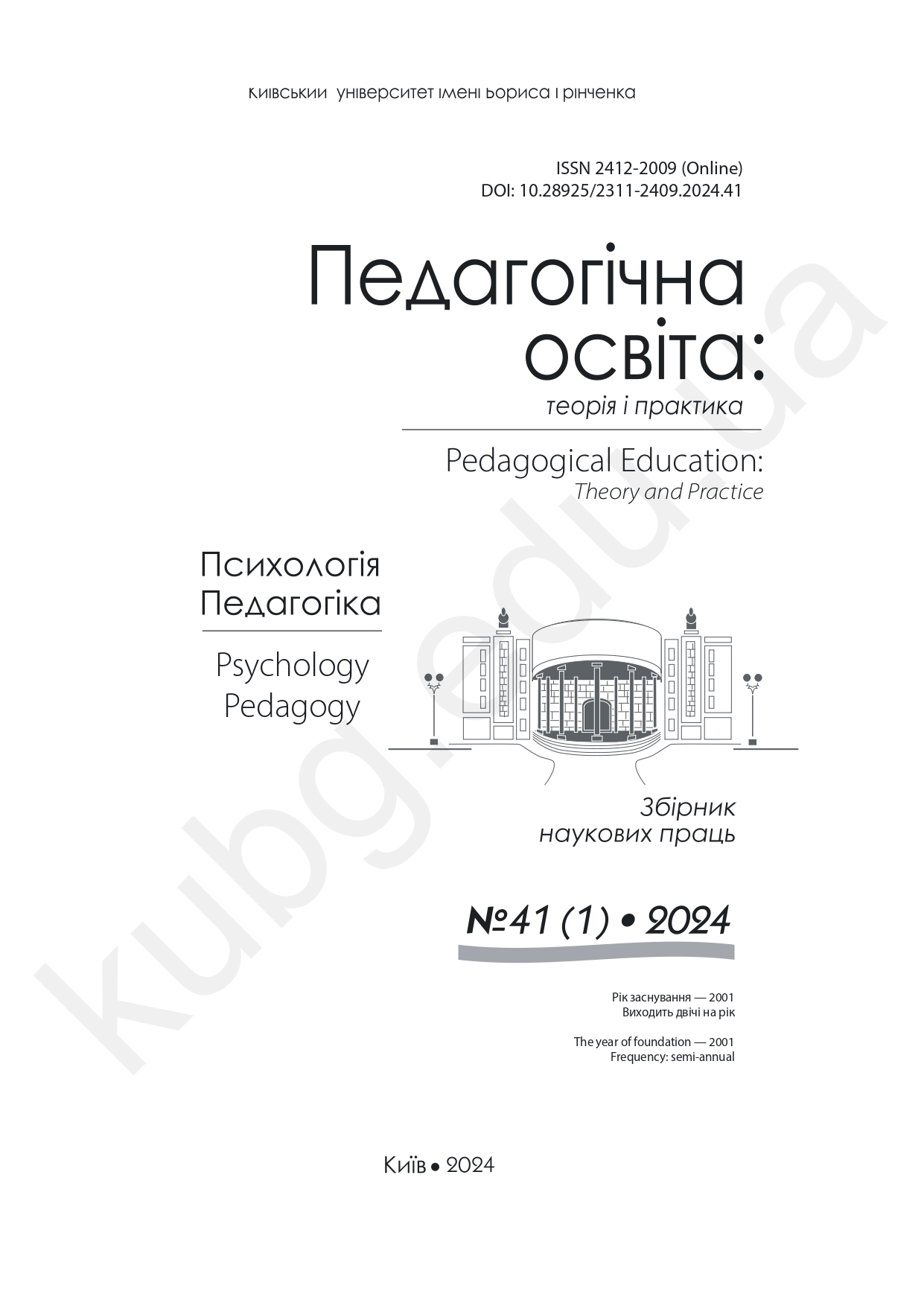Pedagogical conditions for the development of cognitive interests of primary school students by means of project technologies
DOI:
https://doi.org/10.28925/2311-2409.2024.418Abstract
The proposed article highlights the peculiarities of the development of cognitive interests of primary school students by means of project technologies. Project technologies are revealed as an optimal means of organizing students' cooperation among themselves, which takes place taking into account their interests. Within the framework of the conducted research, the need to reveal the content of the related concepts of the key definition, namely: "project", "project activity", "design", etc., has been proven.
The author of the publication defined the category "cognitive interests of elementary school students" as: the state of the student's personality, which is characterized by interest, a desire to learn new things, to acquire new knowledge; the motive for carrying out educational activities, which directly affects the formation of the personality itself.
Attention is focused on the fact that the use of project technologies during education has an impact on the formation of the personality of a junior high school student, and, in particular, on his cognitive interests. It was found that the potential of using design technologies for the development of cognitive interests of primary school students is as follows: creation of emotional conditions, activity of cognitive interests; ensuring the stages of students' awareness of the goals, motives and methods of learning; expanding the limits of using cognitive experience.
The author of the article emphasizes that the development of cognitive interests of primary school students by means of project technologies will be successful through the use of such pedagogical conditions as: 1) increasing motivation and interest in learning through the use of project technologies; 2) creating an emotional connection between the teacher and students at the stage of their involvement in the project activity; 3) activation of problem situations with the use of design technologies.
Downloads
References
Бібік, Н. М. (2011). Пізнавальний інтерес як умова суб’єктності навчання молодших школярів. Педагогічний дискурс. Вип. 10, 53–56.
Киричук, О. І. (2002). Навчальні інтереси молодших школярів. К. : Рад. школа, 128 с.
Метод проектів: традиції, перспективи, життєві результати: практико зорієнтований збірник / [наук. ред. І. Г. Єрмаков]. – К.: Департамент, 2003. – 500 с.
Нова українська школа: порадник для вчителя / під заг. ред. Н. М. Бібік. Київ: ТОВ «Видавничий дім «Плеяди», 2017. 206 с.
Новий державний стандарт початкової загальної освіти. Всеукраїнська серпнева конференція. URL: https://www. nus.org.ua/.../2017/.../NewSchool_Presentationfinal_ 18-08 (дата звернення: 7.05.2020).
Новик, І. М. (2013). Особливості мотивації майбутніх учителів початкових класів до діагностичного супроводу розвитку пізнавальних інтересів молодших школярів. Теоретичний і науково-методичний часопис «Вища освіта України», №3 (дод. 2). – С. 221–224. – (Галузь пед. та філос. науки)
Онопрієнко, О. В. (2008). Структурно-функціональна модель проектної діяльності молодших школярів. Анотовані результати науково-дослідної роботи Інституту педагогіки за 2007 рік. – К.: Педагогічна думка, С. 21–22.
Шустваль, С. М. (2007). Пізнавальний інтерес як мотив навчальної діяльност. Педагогіка і психологія формування творчої особистості: проблеми і пошуки. – Запоріжжя, Вип. 41, С. 379–383.
REFERENCES
Bibik, N. M. (2011). Piznavalnyi interes yak umova subiektnosti navchannia molodshykh shkoliariv. [Cognitive interest as a condition of the subjectivity of learning of younger schoolchildren.] Pedahohichnyi dyskurs. Vyp. 10, 53–56. [in Ukrainian]
Kyrychuk, O. I. (2002). Navchalni interesy molodshykh shkoliariv. [Educational interests of younger students.] K. : Rad. shkola, 128 s. (ukr)
Metod proektiv: tradytsii, perspektyvy, zhyttievi rezultaty: praktyko zoriientovanyi zbirnyk [The method of projects: traditions, perspectives, life results: a practice-oriented collection] / [nauk. red. I. H. Yermakov]. – K.: Departament, 2003. – 500 s. [in Ukrainian]
Nova ukrainska shkola: poradnyk dlia vchytelia [New Ukrainian school: a teacher's guide] / pid zah. red. N. M. Bibik. Kyiv: TOV «Vydavnychyi dim «Pleiady», 2017. 206 s. [in Ukrainian]
Novyi derzhavnyi standart pochatkovoi zahalnoi osvity. [New state standard of primary general education.] Vseukrainska serpneva konferentsiia. URL: https://www. nus.org.ua/.../2017/.../NewSchool_Presentationfinal_ 18-08 (data zvernennia: 7.05.2020). [in Ukrainian]
Novyk, I. M. (2013). Osoblyvosti motyvatsii maibutnikh uchyteliv pochatkovykh klasiv do diahnostychnoho suprovodu rozvytku piznavalnykh interesiv molodshykh shkoliariv. [Peculiarities of the motivation of future primary school teachers for diagnostic support of the development of cognitive interests of younger schoolchildren.] Teoretychnyi i naukovo-metodychnyi chasopys «Vyshcha osvita Ukrainy», №3 (dod. 2). – S. 221–224. – (Haluz ped. ta filos. nauky) [in Ukrainian]
Onopriienko, O. V. (2008). Strukturno-funktsionalna model proektnoi diialnosti molodshykh shkoliariv. [Structural and functional model of project activity of junior high school students.] Anotovani rezultaty naukovo-doslidnoi roboty Instytutu pedahohiky za 2007 rik. – K.: Pedahohichna dumka, S. 21–22. [in Ukrainian]
Shustval, S. M. (2007). Piznavalnyi interes yak motyv navchalnoi diialnost. [Cognitive interest as a motive for educational activity.] Pedahohika i psykholohiia formuvannia tvorchoi osobystosti: problemy i poshuky. – Zaporizhzhia, Vyp. 41, S. 379–383. [in Ukrainian]

